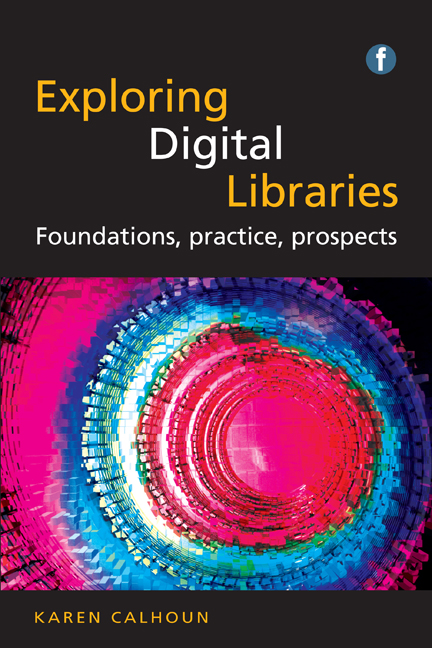Book contents
- Frontmatter
- Dedication
- Contents
- List of figures and tables
- Preface
- Acknowledgements
- Glossary
- 1 Emergence and definitions of digital libraries
- 2 Outcomes of digital libraries’ first decade
- 3 Key themes and challenges in digital libraries
- 4 Digital library collections: repositories
- 5 Hybrid libraries
- 6 Social roles of digital libraries
- 7 Digital libraries and their communities
- 8 The prospects of open access repositories
- 9 Digital libraries and the social web: scholarship
- 10 Digital libraries and the social web: collections and platforms
- References
- Index
6 - Social roles of digital libraries
Published online by Cambridge University Press: 08 June 2018
- Frontmatter
- Dedication
- Contents
- List of figures and tables
- Preface
- Acknowledgements
- Glossary
- 1 Emergence and definitions of digital libraries
- 2 Outcomes of digital libraries’ first decade
- 3 Key themes and challenges in digital libraries
- 4 Digital library collections: repositories
- 5 Hybrid libraries
- 6 Social roles of digital libraries
- 7 Digital libraries and their communities
- 8 The prospects of open access repositories
- 9 Digital libraries and the social web: scholarship
- 10 Digital libraries and the social web: collections and platforms
- References
- Index
Summary
Overview
This chapter examines the social value of digital libraries. It begins by exploring past and present understandings of the value of libraries to their communities. Taking a well known framework that lays out libraries’ social roles as a starting point, the chapter then suggests a possible new framework to describe the social roles of digital libraries. The remainder of the chapter explicates this potential framework, exploring aspects of each social role. The sections offer examples, consider benefits and challenges, and draw attention to key readings from digital library researchers and practitioners.
Introduction
This chapter treats aspects of the topic of the value of digital libraries to society. With respect to the concept map from Chapter 3 (Figure 3.1, p. 64), this chapter deals with the lower right quadrant – that is, the intersection of the communities that use digital libraries and their social and economic aspects. In a nutshell, the following sections center on social roles and how digital libraries might:
• support the free flow of ideas
• empower individuals
• support teaching, learning and the advancement of knowledge
• provide economic benefits
• preserve intellectual and cultural assets for future generations.
The approach to these questions can be informed by a brief look into how libraries’ social roles have evolved in general. The leaders of the 18th-century French and American Revolutions, influenced as they were by classical ideals of free inquiry, the pursuit of enlightenment and the concepts of deism (as articulated, for example, in Thomas Paine's Age of Reason, 1794), tended to define libraries in terms of their social roles supporting knowledge, literacy and the principles of a free society. Olivier Fressard (2008) offers a French perspective on these issues.
The inscription quoting James Madison, the framer of the US Constitution and Bill of Rights, on the front entrance to the Library of Congress Madison Building is an example of their perspective: ‘Knowledge will forever govern ignorance: and a people who mean to be their own governours must arm themselves with the power which knowledge gives.’ These core assumptions about the societal roles of libraries were a factor in the development of strong public library systems, mission-driven national libraries and well funded college and university libraries in democratic societies around the world.
- Type
- Chapter
- Information
- Exploring Digital LibrariesFoundations, Practice, Prospects, pp. 139 - 158Publisher: FacetPrint publication year: 2014



